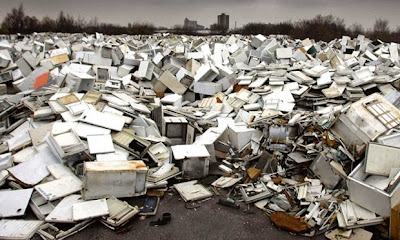"The biggest per-capita tallies were in countries known for green awareness, such as Norway and Denmark, with Britain fifth and US ninth on the UN report’s list"
 |
| Link to web site |
"A record amount of electrical and electronic waste was discarded around the world in 2014, with the biggest per-capita tallies in countries that pride themselves on environmental consciousness, a report said.
"Last year, 41.8m tonnes of so-called e-waste – mostly fridges, washing machines and other domestic appliances at the end of their life – was dumped, the UN report said.
"That's the equivalent of 1.15m heavy trucks, forming a line 23,000km (14,300 miles) long, according to the report, compiled by the United Nations University, the UN’s educational and research branch."

